Welcome to Ninchanese! Ninchanese has a simple and intuitive interface and system you can use to have fun learning Chinese, but we’ve found some features and aspects that can sometimes be overlooked. We want you to have a blast learning Chinese on Ninchanese, so here are a few great tips to have a fully enjoyable Chinese learning experience on Ninchanese. Use these 10 tips and tricks to get the most out of Ninchanese.
1. Try to win the game
The best way to effectively learn Chinese is to have fun learning it. Studies have shown the more you’re enjoying what you’re doing, the better you memorize what you’re learning. That’s why we poured gamification in every aspect of Ninchanese. So you can find learning Chinese with us fun, and addictive even.
Here’s what you can do on Ninchanese when playing “the game”:

- Rack up points for completing stages or playing Ninchallenges
- Go up in levels by reaching experience thresholds.
- Progress farther along in each world
- Unlock all the words and sentences
- Face and gain the Masters’ respects
- Win gold medals in the time attacks
Sounds fun? Great, that’s the idea: You concentrate on getting further ahead in the game and don’t make a conscious effort to study. It’ll do wonders to your motivation, believe us, and the language will sink in without you even noticing. In short, by gaming (on) Ninchanese, you’ll be learning Chinese, but it won’t even feel like studying.
2. Play with friends
In Ninchanese, we know learning with friends is more fun. So we’ve made it easy for you to play and learn with your friends.
Start by inviting your real-life friends to come to join. You can also easily add other Nincha learners as friends in the app. Once you’ve added them, you’ll be able to see your friends’ scores in your friend’s leaderboard. Every week and month, you can compete with them to see who can get the most points and top the leaderboard.
You can also challenge your friends to friendly battles over your knowledge of Chinese in the Ninchallenge section. In a Ninchallenge, you play against a friend or another Chinese learner in Chinese. These quick matches can either be played live (if you and your Ninchallenger are connected on the app simultaneously) or turn by turn. Ninchallenges are a great way to review words and discover new words;
Wondering who to add in the app or to Ninchallenge? It’s your pick, really, but here are a few suggestions:
- When Ninchallenging someone, you want to find ideally someone that’s more or less at your level, so the competition is real. A great way to see who’s close to you is to check out the leaderboard; if they’re edging in on you, chances are you guys are a good Ninchallenge match. If you have a competitive streak in you, adding someone close to overtaking you in the leaderboard can be a real incentive to keep learning Chinese and unlocking new stages on NInchanese to score points. Just sayin’.
- Browse bios and find someone who clicks. Maybe you like their short biographical description or their profile picture. It’s a good start to a Chinese learning friendship.
3. Click the feedback icon if you don’t understand something
Let’s say you’re in the middle of a sentence building stage, and you get the sentence wrong. If you can’t understand why and the lesson you can access through the Help button in-game isn’t helping you, click the feedback button and ask us. Just click on that little speech bubble you see on the left-hand part of your screen (or at the bottom right of your screen on mobile devices) to start a conversation with someone from the Nincha Team!
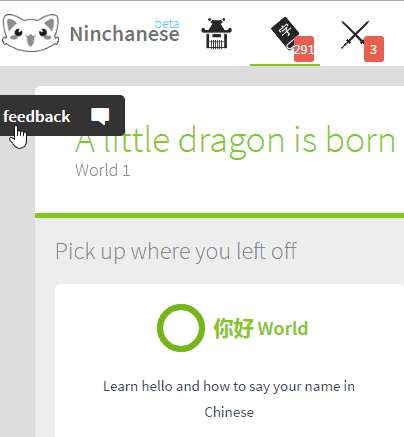
Someone from the Nincha Team is always at the ready to answer your question and make grammar concepts (and any other questions you might have) crystal clear.
4. Chat with your Ninchallenger
Here’s a little secret: you can chat with your Ninchallenger if you’re playing a Ninchallenge live with them.
How do you know if they’re connected at the same time as you? Simple.
When you’re in-game, you’ll see a little icon next to their name:
- A red icon means they’re not currently connected;
- An orange icon means they’re on the app but busy doing something else — odds are if you play, they’ll come to join you —
- and a green icon shows they’re live, playing the game with you!
To say hi, simply type what you want to say before you enter your answer. Your Ninchallenger will see what you’re typing live.
It’s a great way to get to know your Ninchallenger or distract them when playing a Ninchallenge! Until we implement a Chat option in Ninchanese, it’s a little trick to know 🙂
5. Pace yourself
It can be tempting to rush through the vocabulary stages when you’re enjoying yourself but be warned; this has consequences.
Learning vocabulary on Ninchanese is powered by spaced repetition, which is a wonderful algorithm dedicated to helping you efficiently learning new words if you’re not familiar with them.
In essence, any word you unlock, you’ll later be asked to practice via reviews until recalling them is second nature.
Words you’ve unlocked will come back in your reviews at regular intervals, the shortest being one day, the longest being, well…. it can be really far away if it’s now second nature to you.
Our algorithm adjusts times between reviews of each individual word based on your last session. You’ll see a character or word in your reviews at the optimal time for you, not anybody else.
So if you unlock too many words too fast, you’ll end up with reviews piling on, and it might feel overwhelming to try to tackle them each day. So pace yourself and make sure not to overdo the word unlocking. Letting our algorithm space out repetitions for you is essential to memorizing what you learn in the long-term, so it’d be sad not to take advantage of it. Besides, there are plenty of other fun things to do on Ninchanese.
5. Speaking practice makes puurrfect
Fluent, confident speaking comes with practice, so don’t be afraid to try redoing the speaking stages over and over again to improve your score and percentage.
Consider the first time you do a speaking stage your exploratory phase. You’re discovering the dialogue for the first time and getting familiar with the topic, the rhythm, and flow. You may stumble a little when saying the sentences, but that’s normal; that’s always the case when you’re still deciphering the sentences! Once you’ve gone through everything once and finished a speaking stage, take your time reading the sentences in the dialogue; and seeing what you pronounced wrong.
Ask yourself: Are there any words you’ve had trouble recognizing? Then perhaps, you’re not entirely familiar with the vocabulary you just learned and need to review those words a little to make the speaking stage easier for you.
Then, once you feel ready, try the speaking stage again. You’ll be pleasantly surprised at how much better you’ll sound.
Also, because it’s important to understand what the others are saying to be able to speak, we highly suggest you complement your speaking practice with listening stages. That way, you practice your listening, writing, and your speaking skills in Chinese!
The listening stages use the same dialogues, so there’s also a great way to fully familiarize yourself with the sentences. Plus, they’ll train your ear to hear the nuances in Chinese. Believe us; that’ll help you pronounce that much more clearly.
Bonus Tip: Feeling the results aren’t being very accurate?
Your settings might need adjusting. If the microphone levels on your computer are set too low, this will really screw up the readings you get. We suggest you check your microphone levels on your computer and adjust them as needed.
6. Try time attacks!
Each time you finish a vocabulary stage, you unlock Time Attacks for these stages, both in English and Chinese.
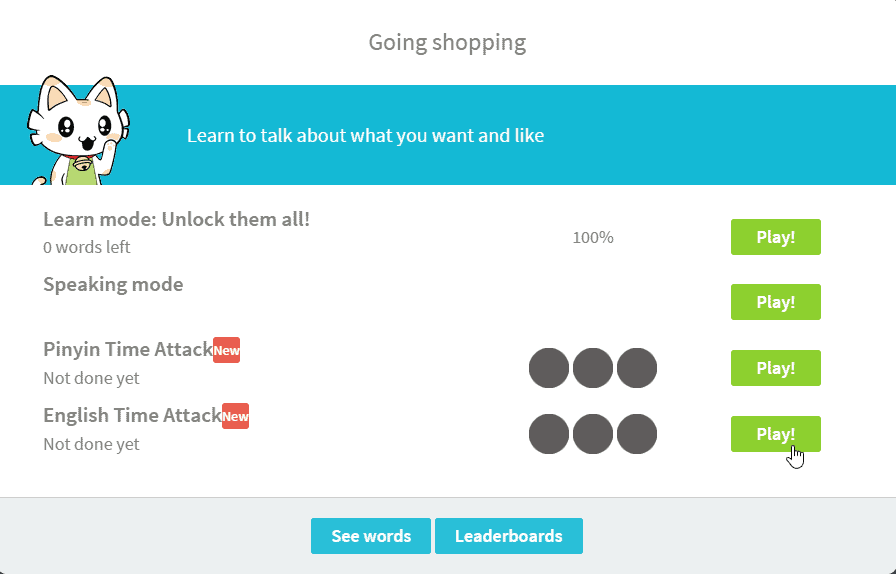
In the time attacks, you race against the clock to finish the stage.
You’ll see, the rush you’ll get from being timed will make things a little more challenging. You’ll be put on the spot to recall a word, both in Pinyin and in English, a great skill to practice and to reuse in real-life when you’re conversing with someone.
Try to win a medal for each stage, and you can be sure you’ll be able to recall those words in the blink of an eye.
7. Learn by doing … (but reading the lessons is ok, too)
Learn by doing
We never explicitly teach you a concept, at least at first, because we believe in learning by doing. Experiment, fail, and as our good friend S. Beckett says, “Try Again. Fail again. Fail better”. Nothing beats inductive learning, and that’s why we don’t tell you anything about grammar concepts or sentence patterns at first. We want you to give it a go and see if you can figure it out on your own. Didn’t someone say, “teach someone to fish, and they’ll be able to feed themselves for a lifetime”? The Chinese Confucian philosopher, 荀子, Xunzi, might not have been as hungry, but he said pretty much the same thing, sans food: “Not having heard something is not as good as having heard it; having heard it is not as good as having seen it; having seen it is not as good as knowing it; knowing it is not as good as putting it into practice.”
Except when you’d rather read first
Been giving it your best go but can’t figure it out? Are things feeling a little fuzzy for one particular grammar concept? That’s okay too. Sometimes, a little explicit explication does wonders once you’ve experimented on your own and tried to spot the patterns. That’s why each sentence-building stage comes with a clear and straight forward lesson to clear any questions and misunderstandings you might have on a particular grammar concept.
8. Take advantage of the bonuses
We’re all for active learning and having fun when you learn. So bonuses are a great way to overcome a difficult question. They’ll give you a boost when you need it.
Sometimes we remember the pinyin; sometimes, a little sentence example helps to put the word in context and remember its meaning, or sometimes we make a mistake and need a little boost. Let see each one of them:
- The Yin yang Bonus
You will answer switch the answer from pinyin to English or English to pinyin. Useful when you’ve got a doubt. - The helping paw Bonus
It will give you a sentence example when available. - The multiplier Bonus
It will give you an x8 multiplier to score more points. Useful when you just made a mistake. Don’t hesitate to use them; you’ll win one as you give good answers.
You can currently use bonuses in the vocab stages with Nincha. Manage your bonuses well, and you’ll really increase your score!
9. Improve your memorization with the detailed word-pages
Look at words in context
Please get to know how to use words better by seeing them used in context.
The detailed word pages are perfect for that and contain lots of example sentences so you can fully understand a word’s different meanings and know when to use which.
The word pages are also full of information to help you memorize a word better:
its stroke order, its character decomposition, words that are related to it…
Which brings us to number 10:
10. Explore characters
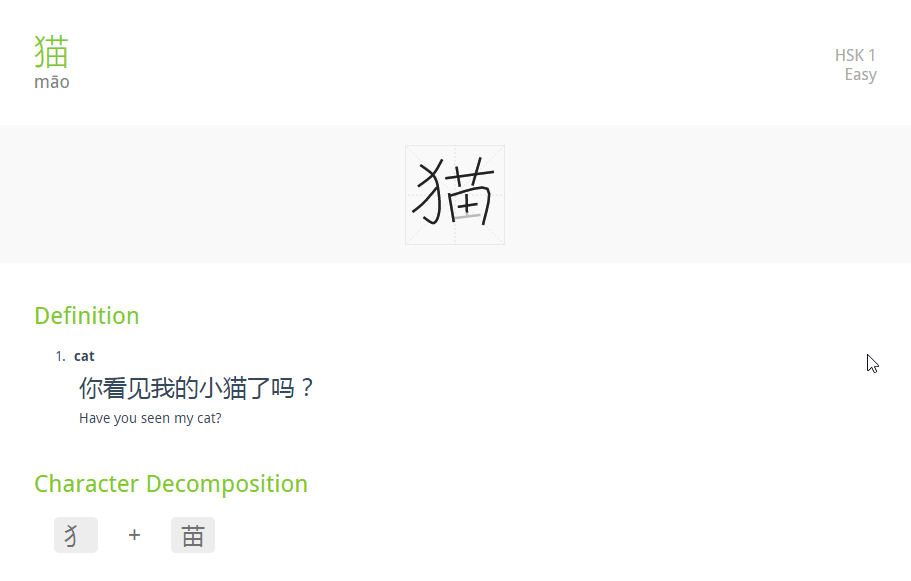
A really cool thing in Ninchanese is that you can click on a component and see where it leads… Components are often words of their own, so it’s interesting to look at what they mean separately and how they’re used and then look at related words that also contain this component, either as a character or as a character component. It helps you paint a network picture of how characters work. It’s an entertaining exploration and a wonderful way to realize that Chinese words often have a lot to do with another. So much so, in fact, that once you know the most common characters, you’ve already finished a good portion of your Chinese learning journey. Happy Exploration.
There are plenty more tips and tricks we could tell you about Ninchanese, but we figure… where’s the fun if we ruin all the surprises? So jump in and get started learning Chinese on Ninchanese! Give these tricks a try and tell us what you think! Are you ready? If you have a trick of your own on Ninchanese, leave them in the comments!
The Nincha Team
Stay in touch with us on Facebook, Twitter, Instagram, and Pinterest.


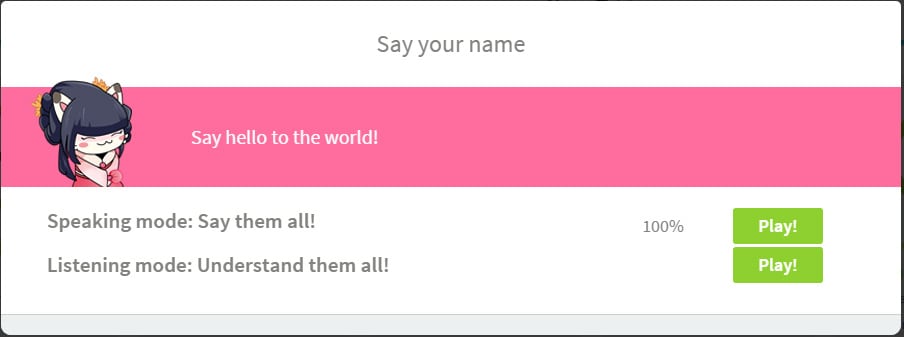
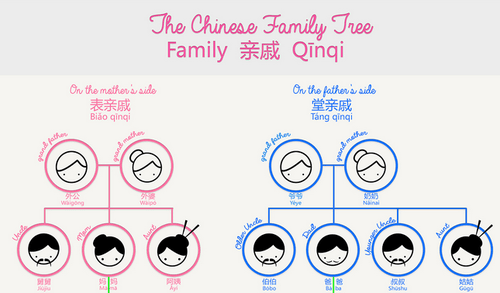



2 comments
Join the conversationPingback: Turn Learning Chinese Into a Habit - Ninchanese
Pingback: Ninchanese – The Hanyu You Want
Comments are closed.